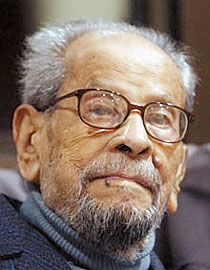The American University Press in Cairo has just released the English translation of a short novel by Naguib Mahfouz titled “Karnak Café”, originally published in 1974.
Out of more than 30 novels and 14 collections of short stories, “Karnak Café” offers a brilliant introduction to the literary qualities for which Mahfouz is so well known: Enthralling dialogue, a deep understanding of Egypt’s social and political problems and a remarkable insight into man’s ideals and shortcomings.
Besides his writing skills, the late great Egyptian novelist (he passed away on Aug. 30 of last year) was also known for his sharp intellect, bright humor and warm character — qualities that show up in his writings and undoubtedly contributed to their readability even in translation.
The novel, as the title clearly indicates to anyone familiar with modern Egyptian history, is set after the 1967 June War (a k a the Six-Day War) in one of those picturesque street cafes so popular in Cairo. During this trying time, known in Arabic as “Al-Naksa” (the setback), Egyptians experienced anger, dismay and despair across the social strata.
The narrator of short novel explains how the population continued to cling to its zeal and enthusiasm, but eventually had to wake up and experience “the most vicious of hammer blows smashing their way into Egyptians’ heads, which were still filled with the heady intoxication of greatness.”
It is appropriate for a great Egyptian novel to take place in a café. In Egypt, a coffee house is a deeply grounded social institution and a venue for truths, lies, rumors, gossip and backgammon, all tinted with a light haze of sheesha smoke that lingers in the air of any traditional Egyptian hangout. The neighborhood café is the headquarters of local neighborhoods, where locals go to catch up on news from and about their neighbors, or to simply sit back and watch the people. Though an actual count would be next to impossible, it is believed that there are over 30,000 cafés in Cairo alone.
Mahfouz (who was, after all, Egyptian) loved to spend time in Cairo’s cafes, especially the ones downtown in the historic center of a city that was founded in the year 648 AD in an area that has been a center of human habitation for well over 5,000 years.
Mahfouz was part of a well-known society of intellectuals, writers, journalists and artists who gathered in the same coffeehouses on a regular basis to discuss politics, art or the latest news.
The Karnak Café, writes Mahfouz, is “a gathering place for people with extremely interesting and provocative viewpoints; whether they yell or speak softly, they are expressing the realities of living history.”
The customers representing a sample of Egyptian society gather around the charismatic owner, Qurunfula whose “enigmatic kind of beauty touched your heart... The carefree mood that she exuded was totally captivating.”
Throughout the novel, the reader is not only brought into the forefront of the discussions taking place in the café but is also treated to the day-to-day life of regular Cairo residents. By a stroke of a pen, the genial Mahfouz paints a true picture of the Egyptians’ bitter reaction to the 1967 defeat and underlines as well what went wrong during Nasser’s 1960s: The intolerable atmosphere of suspicion, suffocating censorship and the omnipresence of the secret police.
The novel’s four chapters are named after the café’s main protagonists, the owner, Qurunfula, customers Ismail Al-Shaikh and Zaynab Diyab, and the wicked government official Khalid Safwan. By the end of the novel, Safwan’s wicked ways have been all but forgotten by his café co-habitants. “There’s nothing like suffering to bring people together,” he says to them.
The translator Roger Allen adds a useful afterward where he highlights how ironic it is “that Mahfouz puts into the mouth of the villain of the piece, Khalid Safwan, the presentation of the alternatives facing the Egyptian people in the wake of the June 1967 defeat, and indeed places particular stress on the goals of those people who would advocate religion as a basis for finding solutions.”
Although “Karnak Café” refers to a particular period of Egyptian history, the political solutions and the dangers mentioned by the author are still relevant not only in Egypt but also in other countries of the region.


